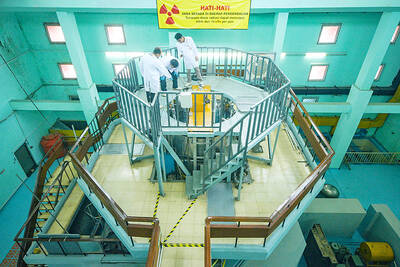A Chinese lawyer convicted of subversion has again been detained after writing to US lawmakers asking them to help expose what he called an "ongoing human rights disaster in China," an activist friend said yesterday.
Gao Zhisheng (高智晟) was taken from his Beijing apartment by plainclothes police on Saturday night, activist Hu Jia (胡佳) said, citing information from Gao's relatives. The relatives did not know where Gao was taken or whether he faced new charges, Hu said.
On Friday, an open letter by Gao to the US Congress was released by the Falun Gong spiritual group. It said Congress could help bring change to China by supporting free media outlets and the opening up of the Internet.
Hu said Gao told him five days before his detention that police had threatened him with jail if he released any open letters or statements.
"More and more Chinese people are speaking out against the coming Olympic Games in China, which they often refer to as `the bloody Olympics' and `the handcuff Olympics,'" Gao said, according to the letter signed Sept. 12.
Under the terms of his parole, Gao has been denied political rights, including the right to free speech and the ability to gather or protest. Such letters violate that order.
Hu said Gao has been repeatedly detained for days or weeks at a time over the past nine months and his latest detention was likely related to an overall tightening of controls ahead of a sensitive political congress next month.
The Communist Party congress, held every five years, will set the agenda for the party and country for the next five years and will likely include a reshuffling of some top leaders. It will also mark a renewal of party leader Hu Jintao's (胡錦濤) five-year tenure.
Gao became a prominent critic of China's civil rights lapses between 2002 and last year. He took on cases involving property-rights violations, the banned Falun Gong group and religious persecution.
He was arrested in August last year on subversion charges based on nine articles posted on Web sites abroad, the official Xinhua News Agency reported then. He was convicted and later placed under house arrest.

Four people jailed in the landmark Hong Kong national security trial of "47 democrats" accused of conspiracy to commit subversion were freed today after more than four years behind bars, the second group to be released in a month. Among those freed was long-time political and LGBTQ activist Jimmy Sham (岑子杰), who also led one of Hong Kong’s largest pro-democracy groups, the Civil Human Rights Front, which disbanded in 2021. "Let me spend some time with my family," Sham said after arriving at his home in the Kowloon district of Jordan. "I don’t know how to plan ahead because, to me, it feels

Poland is set to hold a presidential runoff election today between two candidates offering starkly different visions for the country’s future. The winner would succeed Polish President Andrzej Duda, a conservative who is finishing his second and final term. The outcome would determine whether Poland embraces a nationalist populist trajectory or pivots more fully toward liberal, pro-European policies. An exit poll by Ipsos would be released when polls close today at 9pm local time, with a margin of error of plus or minus 2 percentage points. Final results are expected tomorrow. Whoever wins can be expected to either help or hinder the

North Korea has detained another official over last week’s failed launch of a warship, which damaged the naval destroyer, state media reported yesterday. Pyongyang announced “a serious accident” at Wednesday last week’s launch ceremony, which crushed sections of the bottom of the new destroyer. North Korean leader Kim Jong-un called the mishap a “criminal act caused by absolute carelessness.” Ri Hyong-son, vice department director of the Munitions Industry Department of the Party Central Committee, was summoned and detained on Sunday, the Korean Central News Agency (KCNA) reported. He was “greatly responsible for the occurrence of the serious accident,” it said. Ri is the fourth person

SKEPTICAL: Given the challenges, which include waste disposal and potential domestic opposition, experts warn that the 2032 nuclear timeline is overambitious Indonesia is hoping going nuclear can help it meet soaring energy demand while taming emissions, but faces serious challenges to its goal of a first small modular reactor by 2032. Its first experiment with nuclear energy dates to February 1965, when then-Indonesian president Sukarno inaugurated a test reactor. Sixty years later, Southeast Asia’s largest economy has three research reactors, but no nuclear power plants for electricity. Abundant reserves of polluting coal have so far met the enormous archipelago’s energy needs, but “nuclear will be necessary to constrain the rise of and eventually reduce emissions,” said Philip Andrews-Speed, a senior research fellow at the